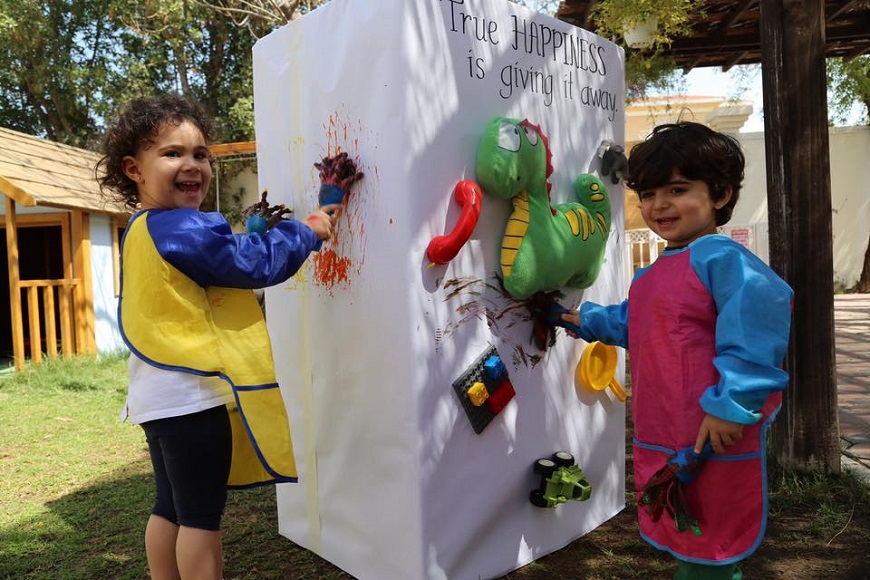Discipline comes from the Latin word “discipliner”, which means, “to teach.” but the discipline that actually works is NEVER about punishment. Discipline is based on the quality of a child’s relationship with the care provider (a teacher in the classroom; mum and dad at home). When a child receives a consistent response from a caring adult, trust, deep attachment and a sense of being wanted develop. This forms the foundation of good behavior and effective discipline. Teachers at ODYSSEY establish a daily routine and frequent communication to develop respectful and meaningful relationships which directly affect behavior and a child’s ability to learn.
The key is to ensure that these relationships are respectful, responsive and reciprocal.
Tips for good behaviour
Be a role model
Use your own behaviour to guide your child. Your child watches you to get clues on how to behave – and what you do is often much more important than what you say. For example, if you want your child to say ‘please’, say it yourself. If you don’t want your children to raise their voice, speak quietly and gently yourself.
Show your child how you feel
Telling your child honestly how his behaviour affects you helps him see his own feelings in yours. And if you start sentences with ‘I’, it gives your child the chance to see things from your perspective. For example, ‘I’m getting upset because there is so much noise that I can’t talk on the phone’.
Catch your child being ‘good’
When your child is behaving in a way you like, give him or her some positive feedback. For example, ‘Wow, you’re playing so nicely. I really like the way you’re keeping all the blocks on the table’. This works better than waiting for the blocks to come crashing to the floor before you take notice and say, ‘Hey, stop that’.
You might also be interested in...
Get down to your child’s level
When you get close to your child, you can tune into what he/she might be feeling or thinking. Being close also helps them to focus on what you’re saying about their behaviour. If you’re close to your child and have their attention, you don’t need to make your child look at you.
Keep promises
When you follow through on your promises, good or bad, your child learns to trust and respect you. She /he learns that you won’t let them down when you’ve promised something nice, and they also learn not to try to change your mind when you’ve explained a consequence. So when you promise to go for a walk after your child picks up their toys, make sure you have your walking shoes handy. When you say you’ll leave the library if your child doesn’t stop running around, be prepared to leave straight away.
Create an environment for good behaviour
The environment around your child can influence their behaviour, so you can shape the environment to help your child behave well. This can be as simple as making sure your child’s space has plenty of safe, stimulating things for them to play with. Make sure that your child can’t reach things they could break or that might hurt them. It’s hard for children to remember not to touch. Reduce the chance of problems by keeping breakables and valuables out of sight.
Choose your battles
Before you get involved in anything your child is doing – especially to say ‘no’ or ‘stop’ – ask yourself if it really matters. By keeping instructions, requests and negative feedback to a minimum, you create less opportunity for conflict and bad feelings. Rules are important, but use them only when it’s really important.
Be firm about whining
If you give in when your child is whining for something, you can accidentally train them to whine more. ‘No’ means ‘no’, not maybe, so don’t say it unless you mean it.
Keep things simple and positive
If you give clear instruction in simple terms, your child will know what’s expected of them. Positive rules are usually better than negative ones because they guide your child’s behaviour in a positive way. For example, ‘Please shut the gate’ is better than ‘Don’t leave the gate open please’.
Say it once and move on
If you tell your child what to do – or what not to do – too often, they might end up just tuning out. If you want to give them one last chance to cooperate, remind them the consequences for not cooperating. Then start counting to three.
Make your child feel important
Give your child some simple chores or things that they can do to help the family. This will make them feel important. If you can give your child lots of practice doing a chore, they will get better at it, feel good about doing it, and want to keep doing it. And if you give them some praise for their behaviour and effort, it’ll help to build their self-esteem.
GOOD CHILD BEHAVIOUR ISN’T MAGIC
IT’S A SKILL, JUST LIKE ANYTHING ELSE







.png?itok=HBSyMDok)









































































.png)



























.png?itok=0fOAXkOm)

























.png?itok=EH_x0Pha)
